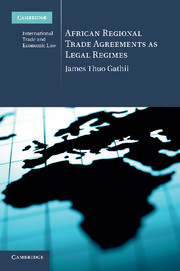Book contents
- Frontmatter
- Contents
- Figures
- Tables
- Acknowledgements
- Abbreviations
- Table of cases
- Introduction
- I African Regional Trade Agreements as Flexible Legal Regimes
- II Variable geometry: A defining aspect of African RTAs
- III Multiple memberships in African RTAs
- IV African RTAs in the context of Article XXIV of the GATT
- V Trade liberalization commitments and realization time frames
- VI Financing African RTAs
- VII African RTA Judiciaries
- VIII Trade remedy regimes
- IX Monetary unions in Africa
- X Intra-African regional trade integration
- XI African RTA relations with non-African RTAs
- Bibliography
- Index
- References
II - Variable geometry: A defining aspect of African RTAs
Published online by Cambridge University Press: 05 July 2011
- Frontmatter
- Contents
- Figures
- Tables
- Acknowledgements
- Abbreviations
- Table of cases
- Introduction
- I African Regional Trade Agreements as Flexible Legal Regimes
- II Variable geometry: A defining aspect of African RTAs
- III Multiple memberships in African RTAs
- IV African RTAs in the context of Article XXIV of the GATT
- V Trade liberalization commitments and realization time frames
- VI Financing African RTAs
- VII African RTA Judiciaries
- VIII Trade remedy regimes
- IX Monetary unions in Africa
- X Intra-African regional trade integration
- XI African RTA relations with non-African RTAs
- Bibliography
- Index
- References
Summary
Introduction
This chapter discusses the principle of variable geometry as adopted in African Regional Trade Agreements (RTAs). The aim of this section of the chapter is to show how variable geometry is a central feature of African RTAs as flexible regimes. The chapter begins by outlining the origins of this principle and giving examples of how various African RTAs incorporate and use it. The last section then discusses the April 2009 Advisory Opinion of the East African Court of Justice (EACJ) on the appropriate relationship between the principle of variable geometry and the rule of consensus decision making in the Treaty for the Establishment of the East African Community.
- Type
- Chapter
- Information
- African Regional Trade Agreements as Legal Regimes , pp. 34 - 64Publisher: Cambridge University PressPrint publication year: 2011
References
- 1
- Cited by



